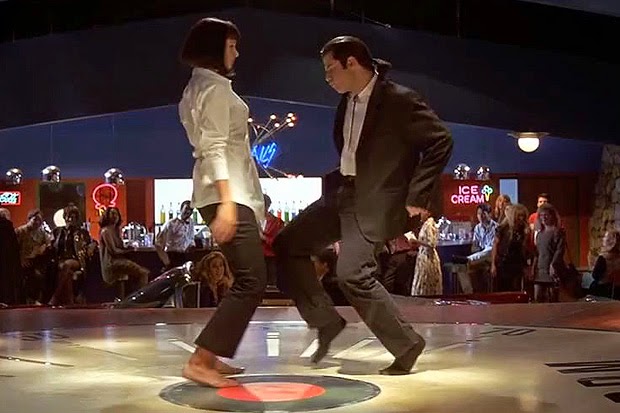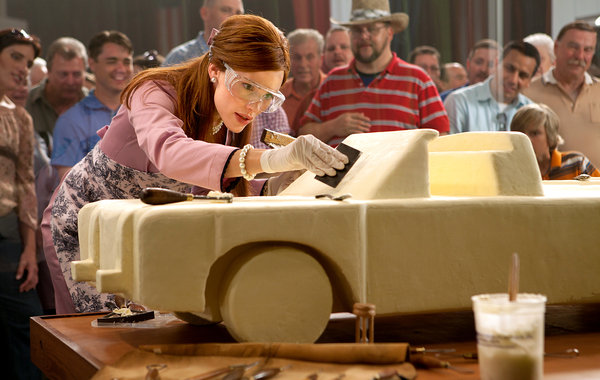Genre: Action/Superhero
Premise: Immediately after meeting the love of his life, a merc receives a terminal cancer diagnosis. After being turned into a freak by a fake experimental cure, he declares revenge on the man who made him this way.
About: Everyone knows the story by now. Rhett Reese, Paul Wernick, Ryan Reynolds, and director Tim Miller have been trying to get this movie made for 7 years (Ryan Reynolds even longer). Fox didn’t think a hard-R superhero film would work but reluctantly gave the group a small amount of money to shoot some test footage. When it came back, the execs weren’t impressed and the movie seemed to die for good. But then one of the four (they won’t tell us who) leaked the test footage online, the internet went crazy, and Fox decided, eh, why not. Still, they considered it EXTREMELY risky and didn’t like the film’s prospects, giving the production a very non-superhero-like 60 million bucks, hoping for a tiny profit. Well, the film’s been setting all kinds of records, racking up 150 million dollars at the box office, blowing away expectations left and right. It’s safe to say that Deadpool may have just done for Fox what Iron Man did for Disney. Here is my previous script review.
Writers: Rhett Reese & Paul Wernick
Let’s be honest here. There’s something about analysts, number crunchers, and marketing experts being wrong that tickles our film-loving posteriors. Formulas can’t tell us what audiences want. What audiences want are good movies, something fresh, something that resonates. And that can’t be quantified by a database of “comps” (by the way, when did the “comps” term migrate from the real estate market to the movie business??)
And the nice thing about this weekend’s screw-up is that nobody gets hurt. Deadpool made a bajillion dollars for the studio. They’re going to make bajillions more on sequels and an expanded universe. All is good at 20th Century Fox this morning, and I’m sure all those number crunchers are retroactively reframing their warnings (“I didn’t say it WOULDN’T do well. I said it wouldn’t do well if it was released in the SUMMER. Remember? That’s what I said. I never knew you were going to release it on Valentine’s Day. I would’ve redone the comps if you would’ve said that”).
For those who haven’t seen the film, it’s a superhero origin story with a twist. Or a few twists. This guy, Wade Wilson, falls in love with a prostitute. He’s then told he has terminal cancer. Resigned to his fate, Wade gets a hail mary pass from a mysterious man who says he can cure him.
Wade decides to take that chance, only to find out the whole thing is a front to torture desperate people. Wade is tortured in a lab for months, and the experiments turn him immortal (yeah, I know, I didn’t understand that either). They also burn his face into a crispy pizza pie looking mess, and when Wade finally escapes, he can’t exactly slide unnoticed back into society.
So he becomes a costume-wearing killer! Yeah! He also goes looking for the man who made him this way, AJAX, whose rather questionable power is that he can’t feel pain (c’mon, couldn’t we have found someone better than that?). Wade (now “Deadpool”) even grabs a couple of X-Men to help him, Colossus (a giant steel man) and Megasonic Teenage Warhead, a teenage girl who’s sooooo over it. Together, the three take on Ajax and his baddies, and Deadpool does (or does not?) get his revenge.

So how did this change from the original script that received so much buzz when it first leaked? It’s weird. It feels like it changed a lot, and yet not at all. Really, things were just moved around, or rephrased. I remember in the script there was this endless voice over where something awful would happen to Wade (I think being diagnosed with terminal cancer) and he’d tell us, “This is only the 7th worst thing that’s happened to me in my life.” Which was kind of cool, cause you’re going, “Jesus, I want to know how bad the first six things were!”
They got rid of that. And then there was stuff like the experimentation torture. If I remember correctly, the original script had Wade being tortured for 7-10 years. Somewhere along the way, they must have realized that it would be odd to throw Wade back into his buddy system 10 years later. So they kind of fudge it in the movie. It might’ve been 5 years, it might’s been 5 months. Whatever the case, it was a better choice. There was no need to torture Wade for 10 years.
The movie still kept the script’s schizophrenic timeline though. We’re in the present, then we’re in the past, then the later present, then the later past. Here’s the thing if you’re going to try to pull this off – it’s great to have a running voice over so that the narrator/hero can immediately tell us where we are. Where I see these excessive time jumping devices fail is when there’s little explanation of what’s happening. When we jump to the past in Deadpool, Wade is there to tell us where we are in a voice over, so we’re never lost.
One of the biggest changes from the script occurs in the area I was most worried about – character development. I didn’t FEEL anything in the Deadpool script. I just thought it was cool. But in the film, they really go all out in exploring Wade.
And this is a great lesson for writers who hope to work in the industry someday. The reason they made this so character heavy was because they had to. They didn’t have 200 million dollars like Iron Man. They had 60. That severely limits your show-stopping superhero set pieces. And from what I understand, nobody gets the exact budget they want. The studio always slashes it. So, like Reese and Wernick, you too will be asked to dial back your action spectacle and fill those set pieces in with something else.
And it’s kind of a win-win when you think about it. Your job when you write a script is to move people. When you have 200 million dollars worth of toys, you’re more interested in moving 50 cars across a highway in the greatest chase scene of all time. Deadpool REALLY gets into its love story (cheap to shoot!), really gets into Deadpool’s alienation (cheap to shoot!) and really gets into his mundane day-to-day life (cheap to shoot!). All of this not only kept the budget down, but it made this superhero film unlike any superhero film we’ve seen before (giving audiences the “fresh” take they’re looking for).
Deadpool also had a secret weapon that helped hide its low-fi approach – Deadpool himself. I don’t think Batman or Spider-Man or Superman could’ve survived a 60 million dollar budget because none of them have the personality to keep us entertained during long stretches of set-piece-less scenes. But Deadpool is his own stand-up comedy routine. Even when things “aren’t happening,” he’s still saying funny shit, either through voice over (“Now I bet at this very moment your girlfriend is wondering how you convinced her to come see this shit”), or to other characters (“Hash-tag, driveby”).
And then of course there’s Reynolds himself. I’ll be honest. Reynolds has always struck me as an okay to occasionally decent actor who was extremely lucky to keep working. He just never seemed to have the gravitas to break out. Bill Simmons even once wrote an article pointing out why Reynolds wasn’t a movie star. This goes to show that, as an actor, when you find the perfect part for you, you can shine. And that should be a lesson to screenwriters as well. When you’re stuck in a script you don’t believe in or that doesn’t highlight your talents, it’s not going to end well, no matter how hard you try. But if you find that story you love and that your type of writing is perfect for, you’re going to write something great.
As a movie, I thought this was on par with the script. A fresh and unique way into a stale genre that does a solid job. I’m more enamored with the story behind the story here. I’m just so happy for everyone involved.
[ ] what the hell did I just watch?
[ ] wasn’t for me
[x] worth the price of admission
[ ] impressive
[ ] genius
What I learned: The making of Deadpool is a story of two qualities that are ESSENTIAL to succeeding in this business: passion and perseverance. Without these two qualities, you will fail. Hollywood is a cold place that doesn’t give a shit. But when you love something and you’re willing to put everything into showing it to the world, assuming you’ve done the hard work (you’ve studied the screenwriting craft and become the best screenwriter you can be), you WILL succeed. Don’t run away at the first, second, third, or fiftieth “no.” Keep going like these four and you’ll find your salvation. And there will be those who doubt this. But if you asked everyone who’s ever made a film how they got their movie made, the large majority of them will give you a story similar to this.
Get Your Script Reviewed On Scriptshadow!: To submit your script for an Amateur Review, send in a PDF of your script, along with the title, genre, logline, and finally, something interesting about yourself and/or your script that you’d like us to post along with the script if reviewed. Use my submission address please: Carsonreeves3@gmail.com. Remember that your script will be posted. If you’re nervous about the effects of a bad review, feel free to use an alias name and/or title. It’s a good idea to resubmit every couple of weeks so your submission stays near the top.
Genre: Dramatic Psychological Thriller
Premise (from writer): After a traumatic experience places them together, a young woman, fearful of large dogs, agrees to watch a stranger’s aged dog. When she tries to find the stranger to give it back, her search becomes a dangerous and heartbreaking journey of self-discovery.
Why You Should Read (from writer): I lost a pet recently. I went to a local pound to maybe adopt another. They say don’t look the dogs in the eyes at first. They may take it as a threat. Just stand close, let them feel you out. If the body language appears relaxed, then meet eyes with them. But it’s almost impossible. We communicate so much by meeting eyes. I could not do it. Besides, the looks from the dogs, one after the other, resigned to their fate, checked out totally or gone looney. So little hope. It was just overwhelming. So, I gravitated to those dogs who were blind. Found comfort in them. — And that day, with that experience, this story came to me. — It’s short for the time crunched AOW reader. It’s sweet. It has a girl and a boy who are meant to be together and life is cruel but does give them their moment. — It has a girl and a dog instead of a boy and a dog. It has grit and fight from both of them. — I did some cover art for it because I just couldn’t get that damn title centered on the page.
Writer: Randolph Scott Williams
Details: 85 pages
Thanks for all the help you guys gave the amateur writers last week. That’s what I love about this community. When you’re called upon to help your peers, you do so with gusto. I also want to congratulate yesterday’s “Off-The-Nose Dialogue” winner, Zadora, who took the day’s lesson and ran with it. He/She did everything I hoped for. Make sure to read Zadora’s scene (it’s about 6-7 comments down if you filter comments by “Top.”) to see how to pull off “off-the-nose” dialogue with ease.
Okay, on to today’s script. As I mentioned last week, this edition of Amateur Offerings included submissions I had problems with. With Minder, there were a couple of problems. First, the logline was a mess. “After a traumatic experience places them together, a young woman, fearful of large dogs, agrees to watch a stranger’s aged dog. When she tries to find the stranger to give it back, her search becomes a dangerous and heartbreaking journey of self-discovery.” There are a million things going on in this logline. It’s too big (two sentences?), too scattered, and not very well written (“fearful of large dogs?”).
Remember, loglines should be simple and to the point. I liked Scott Crawford’s suggestion: “After a young woman is rescued by a dog, she embarks on an epic journey to return the animal to its owner.” Blueblossom also made a good point on why this logline was so confusing: “When I read it, the genre and the logline didn’t seem to complement one another very well. Like, I suppose I don’t generally think of psychological thrillers as involving heartbreaking journeys of self-discovery.”
With that said, the “Why You Should Read,” indicated a script with potential. We’re all trying to move people with our stories, and this suggested a moving experience for the writer. Could he transfer that to the page? Let’s find out.
24 year old Thera is a bit of a shut-in. She’s happiest when inside her apartment, avoiding any and all who threaten the sanctity of her introverted utopia. On one of the few days she ventures into the world, she has the misfortune of losing her phone.
Lucky for her, a mysterious gentleman snatches it up and returns it to her. Thera is so thankful, she asks the man if he needs anything. Yes, actually. He’s going away for the weekend. He needs somebody to take care of his dog.
Thera doesn’t like dogs. But this gentleman’s gesture was so kind, she figures she’ll suck it up for the weekend. What she doesn’t know is that the dog is on its last legs. It’s blind. It’s sick. It’s dying. And to add insult to injury, it’s huge! Not exactly the cute little cuddle-machine Thera had in mind.
The man leaves Thera with a list of places the dog likes to visit and goes on his merry way. One problem: He doesn’t come back. The weekend passes and Thera’s still stuck with this big lug of a dog. So she opens an impromptu investigation, using the clues of these visitation spots to find out where the man lives so she can return the dog!
One thing leads to another and Thera finds out this dog used to be a fighting dog. But by that time, it’s too late. The dog-fighting criminals lock her up in a room and bring the dog out for one last fight. What Thera doesn’t know is that this mystery goes much deeper than dog-fighting, and that there’s a bigger reason she was chosen to take care of this dog in the first place.

I’m no stranger to loving dog-centric screenplays. One of my favorite scripts is Dogs of Babel. So while my first instinct was to say Minder was too off-kilter to work, I had to remind myself that I’d fallen in love with, if not a similar premise, one that covered much of the same ground.
That led to the obvious question: Why did I like Dogs of Babel so much better than Minder? For starters, Dogs of Babel was CLEARER. A man’s wife had taken her life, and in a desperate attempt to find out why, he developed a relationship with her dog. I don’t know. It just made more sense to me.
Minder feels more scattered, and it starts with the logline. Actually, I take that back. It starts with the genre. “Dramatic Psychological Thriller” screams, “I have no idea what my genre is.” And if you don’t know what your genre is, it’s going to show up in your writing. Screenwriting is all about being clear. And I was never clear on what this was.
The truth is, genres never cover one thing. Just because you’re writing a drama doesn’t mean you can’t include comedy. And just because you’re writing a thriller, it doesn’t mean you can’t include drama. BUT! You need to understand your dominant genre – the one that dictates 90% of the tone. That’s why I like single-denomination genres. DRAMA. COMEDY. THRILLER.
The next step in genre-assignment is combos (Dramedy, Sci-fi Horror), and those can work. But you still need to understand what the dominant genre is. Once we get into triple-combos, that’s when I know the writer doesn’t know what kind of movie he’s writing. And I think that’s the issue here. Is this a mystery? A thriller? A drama? A coming-of-age movie? I’m not saying you can’t include all of these in a single movie. You can do anything you want! There are no rules! BUT. Know that’s it’s insanely hard to balance all of these in a single script. Most of the time, you’re going to leave your reader confused.
If all that’s got your head on a top, here’s a simpler way to look at it. Is there a movie out there like the one you’re writing? Not the exact same thing. But something that could be presented in the same manner. If there isn’t, you’re probably writing something too weird. Now, of course, you may have stumbled upon the holy grail of unmade ideas (Being John Malkovich). But it’s more likely you’ve written a script without a clear identity.
Despite all of this, Minder is not a bad screenplay. There’s enough of a mystery here to keep you curious. There’s some very thoughtful character development that went into Thera. I liked the potential love story with the upstairs neighbor. And the writing (save for some occasional sloppy formatting) was thoughtful and painted a clear picture.
I just think this is a movie that only gets made if the writer makes it himself. And that’s not a bad thing. Most movies get made with passion. But this is a hard area to produce a movie in. One of the best scripts ever written, which is now six years old, is still looking for financing. So it’s an uphill battle. I wish Randy luck though. ☺
Script link: Minder
[ ] what the hell did I just read?
[x] wasn’t for me
[ ] worth the read
[ ] impressive
[ ] genius
What I learned: Understand your dominant genre. It’s okay to create a hybrid, but know the genre that’s going to be carrying the majority of the genre load.
One of the unfortunate things I’ve run into from reading tons of amateur screenplays is that screenwriters rarely practice specific skills. Their only practice comes from writing entire scripts and while that’s better than not writing anything, it doesn’t improve the dozens of specific skills you need in order to become a master screenwriter.
When I used to teach tennis, I didn’t just hit balls back and forth with my students and say “Good luck” in their next tournament. We identified specific weaknesss and then drilled those weaknesss. If a player’s backhand sucked, I wouldn’t let him leave the court until he made 50 backhands in a row. If they were double-faulting in their last match, we’d spend an entire lesson hitting second serves.
Writing isn’t any different. If you suck at suspense, you need to practice writing suspenseful scenes. You’re not going to magically get better through writing a bunch of screenplays. You need to target the problem.
One of the best ways to do this is through writing scenes and short scripts. Whatever you’re lousy at, pick a scenario, write a short about it, and practice that weakness. That’s what I want to do with this practice series. Give you a common weak point in amateur writing and have you guys write a scene practicing it. You can link to your scene in the comments and the user who gets the most up-votes wins. Not sure what they win yet, but we can come up with something. If you guys like this series, we’ll continue it. If not, it will go the way of the Sunday Obscure Movie Recommendation.
We’re going to start off big. One of the most egregious mistakes I see amateur screenwriters make is on-the-nose dialogue. This just came up in a script I consulted on two weeks ago (actually, if I’m being honest, it comes up in 70% of the scripts I consult on). The writer had written a funeral scene. And at the wake, the mother and son talked about how much they loved the dead father, how important he was to their lives, the wonderful things he had done in life, how they were upset he didn’t keep in better shape, because maybe then he wouldn’t have died. It was ON THE NOSE to the max.
On-the-nose dialogue is two things. It’s characters saying exactly what they feel. And it’s characters saying what’s already obvious. We’re at a funeral where dad just died. We don’t need three pages of dialogue where mom and son talk about how sad they are that dad died. We already know that because we’re at a funeral and the characters look sad!
So one of the best ways to cure on-the-nose sickness, is with something I call “off-the-nose” dialogue. To practice this, set up an extreme emotional situation. Maybe it’s a funeral. Maybe it’s a break-up. Maybe it’s a promotion. Then write dialogue where the characters are allowed to talk about anything BUT their feelings OR what happened. What you’ll find is that your dialogue comes alive.
So let’s go back to that funeral scene. Instead of the son saying, “Man, I’m so bummed that dad is dead,” have him say, “What’s for dinner tonight?” And go from there. One of the most powerful things you can do in dialogue is to play AGAINST the emotion. So if someone’s died, have your characters joking around. If someone just won the 180 million Powerball, have him complain that now he has to get a new place and he hates the stress of moving.
Now I’m aware that in some cases, your characters WILL say what they’re thinking. And even sometimes in off-the-nose dialogue, you’ll allude to what happened (as our Powerball winner just did with his comment). This isn’t a black and white thing. It has some grey area. But overall, dialogue works best when you stay away from the obvious. And that’s what today’s practice series is about. So remember: Don’t allow the characters to discuss what they’re feeling and don’t allow them to comment on what’s already obvious.
Best short script and/or scene wins. Upvote your faves! Good luck!
Genre: Comedy/Satire
Premise: A mother in the midst of an extended mid-life crisis tries to keep her family together, which is falling apart along with her.
About: Where’d You Go, Bernadette is a novel by Maria Keogh Semple, who has an interesting backstory. Born into the craziness that was Hollywood, her father was a screenwriter who wrote the pilot for the original Batman TV show. Maria would follow in his footsteps, growing up to be a screenwriter first, writing on the original Beverly Hills 90210, Saturday Night Live, and Arrested Development. “Bernadette” is her second novel and was a breakaway bestseller, due to its weird formatting of following the story in e-mails and texts. The script is being adapted by Fault in Our Stars writers Scott Neustadter and Michael H. Weber.
Writers: Scott Neustadter & Michael H. Weber (based on the novel by Maria Semple)
Details: 139 pages (2nd draft)
I get it. Not all of you have the time to read scripts. And if you’ve got a choice between reading and writing, you should be writing anyway. BUT, even if you’re not a vociferous reader, there are certain screenwriters who, when a new script of theirs drops, you need to read it. Sorkin is the big one. Tarantino. Christopher McQuarrie.
And believe it or not, Neustadter and Weber are racing up that list. Not only can they turn cancer into hundreds of millions of dollars, but even comedy A-listers like Seth Rogen and James Franco are courting them (for their adaptation of “The Room”). Where’d You Go, Bernadette, though, is their biggest challenge by far. How does one adapt a novel written in e-mails, memos and transcripts?
40-something Bernadette Branch is… different. An isolationist, her only contact with the outside world comes when she picks her daughter, Bee, up from school every day. And even that’s a chore since it requires her to mingle with other mothers, such as her nemesis, Audrey Griffin, and Audrey’s no. 1, the deceptively sneaky Soo-Lin.
The one source of pride in Bernadette’s life, besides her daughter, is her husband, Elgin, a computer genius who’s on the verge of syncing computers up with the human brain. When the three are having dinner at their strangely dilapidated mansion, Bernadette couldn’t be happier.
Unfortunately, a new wrinkle has entered her life. A long-forgotten promise she made to her daughter has resulted in her having to commit to a cruise to Antarctica. Since Bernadette can barely handle going down to the corner store, a trip to Antarctica will probably tear her open from the inside-out.
So Bernadette turns to her secret weapon, a virtual assistant in India she communicates with on e-mail. This assistant does all the anxiety-inducing tasks Bernadette must deal with on a daily basis – such as order food – and now she’s going to need her to plan her entire Antarctica cruise so Bernadette doesn’t experience death-by-icicle.
Through a strange coincidence, Audrey’s right-hand girl, Soo-Lin, who works at Elgin’s company, has just been promoted to his assistant. The two become friendly and Soo-Lin makes Elgin aware that his wife is borderline koo-koo. And if he doesn’t do something to save her soon, Bernadette may not be able to handle the stresses of life much longer.

I’m not sure what to make of this one guys. It’s soooooo weird. I’ve come up with two possibilities. One, this is one of those books someone writes to show how “literary” they are. Write a bunch of weird shit in weird ways and who cares if it makes sense. It’ll impress the critics and that’s all that matters.
The second possibility is that Semple was drunk. I’m talking legitimately wasted. And since she’s talented, she sort of makes it work. But she must have missed the second half of Hemingway’s famous mantra: “Write drunk. Edit sober.” Cause I’m pretty sure she edited this drunk as well.
I’m bringing up Semple and not Neustadter and Weber because this is her beast. Neustadter and Weber are simply trying to reign it in. And how do you reign something in that has no story? Yesterday we were talking about giving your script a clear goal. We definitely don’t have that here. The only plot point we keep revisiting is the Antarctica stuff. And since it doesn’t have any stakes (or even relevance) attached to it, it’s not driving the narrative forward.
I can see why they hired Neustadter and Weber. These are the guys who made the weird time-jumping narrative “500 Days of Summer” work. You figure if anyone can piece e-mails into scenes, it would be these two. But they seem downright confused by this book.
First of all, the one narrative thread that might save this script is the mystery: What happened to Bernadette? Where is she? But we don’t get to Bernadette missing until there’s 30 minutes left in the film. I don’t know many movies where you save your major narrative engine for the final act. Why wouldn’t you put it at the beginning, then back up flashback style, before rejoining the mystery later?
Maybe Neustadter and Weber are trying to be cute? Seeing how far they can bend the rules of storytelling? I don’t know. But this is a script with multiple character voice overs, some of which are audio flash-forwards discussing the past. We’re doing full-on origin story flashbacks here. Bee occasionally narrates. The lone story-carrot dangling in front of us is an Antarctic cruise. I mean this adaptation has all the makings of screenwriting seppuku.
And even if you get through that, you still have to conquer the razor-thin tone. This is a movie that wants you to laugh (a mulberry-driven mudslide that ruins your villain’s party) but also acknowledges super heavy shit, like bi-polar depression and multiple miscarriages. Am I supposed to cry? Laugh?? I have no idea!!
I see this going one of two ways. As a showcase for some amazing female actress, likely a Sandra Bullock or Julia Roberts type. If they nail the part, the movie markets itself as an acting tour-de-force. Or it could become the next “Butter.” For those who have forgotten, Butter won the Nicholl Fellowship, finished high on the Black List, and was similar to Bernadette in a lot of ways. A satire on conservative families based around a series of ludicrous ideas (A butter-carving contest). Both properties are so execution dependent that one wrong move dooms them. And Butter clearly landed on the wrong side of the expiration date.
But I will say this: At the very least, Bernadette is original. There’s nothing else like this out there and we need that. We can’t live solely on a diet of super-heroes and biopics. We need some variety and this project has it. Unfortunately, the darn thing varietied itself into variety purgatory. We’ll have to see if this dynamic writing duo can save it in future drafts. But for this draft, there were too many faults in its stars.
[ ] what the hell did I just read?
[x] wasn’t for me
[ ] worth the read
[ ] impressive
[ ] genius
What I learned: Don’t wait to reveal your story’s big selling point until the last act (here, we’re referring to the mystery of where Bernadette disappeared to). Try to get that plot point into the story as soon as possible. You may not be able to do that in a linear way, but you have other options. For example, you could’ve started this movie out telling us Bernadette was missing, and then jumped back in time to give us the events that led up to that problem.
Genre: Comedy
Premise: In the near future, a group of astronauts on an extended mission run into another ship with an all-female crew. Having not seen women in over five years, the astronauts can’t keep their sexual urges in check, leading to all sorts of shenanigans.
About: This script just sold (or came together as a package) last week. This is going to be a big one, as it stars what might end up being the greatest onscreen comedy trio of all time: Seth Rogen, Zack Galifianakis, and Bill Hader. It’s written by Rodney Rothman, who wrote 22 Jump Street, Grudge Match, and a ton of TV, dating back to his time as a head writer on the Late Show with David Letterman. The film seems to be greenlighted off of the recent huge success of other space-related movies in the marketplace (Force Awakens, The Martian, Gravity). Bringing a comedy angle to this niche only seemed natural.
Writer: Rodney Rothman
Details: 115 pages – undated
So the other day, I was giving notes on a comedy through my consultation service, and it was really frustrating. Because the writer was good. I mean he had such a grasp on his characters. They were all different from one another, they were funny, they popped off the page. The problem was that the story was all over the place. The goals kept changing and each successive change was less interesting than the previous one. All of this led to a choppy reading experience.
Now yesterday we were talking about Spotlight. Despite my issues with the character development in the script, the plot is beautifully simple and easy to follow: GET THE EVIDENCE that exposes widespread sexual abuse in the church and then write the article about it. That’s it. There’s never a moment in Spotlight where you don’t know what’s going on. The goal is always clear.
As much as I thought that character development is what’s keeping amateurs out of the big leagues, I’m realizing that a lot of you are still having problems with plotting, structure, and story. And that needs to be sorted out before the character stuff because Hollywood expects structure to be a given. If you can’t do that, you need someone to help you figure it out. Cause no studio execs I know buy wandering stories that get less interesting as they go on.
There are basically two approaches to structure. There’s the Spotlight approach, where you set up the big goal in the first act and everything going forward serves that goal. Or there’s the “changing goals” approach, where goals are achieved in the script and then new goals replace them.
The reason the “changing goals” approach is tricky is because it requires an extra skill – each time a new goal is introduced, it must be bigger than the previous one. Because think about it. If your hero is going after, say, the Ark of the Covenant. And they get it on page 30. And then you give us a new goal, where your hero is trying to get $2000 to make his rent that month, the audience isn’t going to go along with you. You just had the biggest artifact in the world driving your story and now you want us to care about rent?
As long as you understand the challenge that comes with this new variable, you should be okay writing a “changing-goals” script. Which is something Rothman does with today’s script, The Something. Hopefully, we can learn from him.
The Something jumps right into its story (always preferred), as we observe our soon-to-be-astronauts during their astronaut interview process. There’s McMurphy, our hero, who’s got a Bill-Murray like “who gives a shit” quality to him. There’s Bozark, who’s way too enthusiastic about even the most mundane things. There’s Stirrup, an anti-Boy Scout who’s had a self-imposed bumpy life, and finally Wingate, our arrogant soon-to-be Captain.
After a quick training session, the group is sent a trillion miles away to mine a potent energy source from asteroids. Originally promised that this would be a 2-year trip, they’re now on year 5 and nowhere near their mandated quota to return to earth. Needless to say, everyone wants to kill each other, and if there isn’t a miracle within like, two days, that’s exactly what’s going to happen.
Luckily, there is a miracle. Another ship! The group goes crazy and manages the get onto this ship, and as if God himself were looking down on them, it turns out the ship has an all-female crew. Well, “all-female” is a little misleading. There’s the hot Captain, Cordelia, the girl-next-door, Olivia, and finally “Sister,” the “2001”-like female computer on the ship.
It turns out the women have been pretty desperate for male company so the next thing you know, the two crews are having an all-night party. Still, something seems off about the whole thing. And later, our drunk crew wanders into a secret bay where they find out the women are transporting an alien!
Curious (and drunk), the guys release it, and that’s when everything goes to hell. The alien starts anally mating with people, multiplying, and threatening to kill all of them if they don’t do something drastic. When the others are compromised, it will be up to McMurphy to save the day. But since McMurphy has just put a premium on his relationship with Olivia, his priorities might prevent him from doing so.

From a comedy standpoint, I didn’t really dig this. It’s just not my style. Unlike Lucas and Moore, who seem a little sharper with their comedy, Rogen’s crew likes to keep it low-brow. And there’s nothing wrong with that. Different people think different stuff is funny. But when your pivotal climax moment includes a ten-second fart… I don’t know. I just feel like you can do better.
But whatever. The comedy is what it is and these actors are hilarious so I’m sure they’ll make it work.
Today, I wanted to talk about that structure, specifically how Rothman uses the changing-goals approach to frame his story.
The first goal driving things is mining the asteroid juice. It’s small but you have to start small on a goal-changing script if you want to build. After the crew goes insane, McMurphy’s goal is to get the ship back to earth. That’s all he cares about. Still small, but slightly bigger than the previous goal.
Next is the arrival of the mystery ship. McMurphy’s goal is to get on that ship. They’re not allowed to make contact with AAA ships, so McMurphy has to sabotage his ship to con their way onto there. Once they get on the ship, there’s a new goal. Get laid.
Now, the get laid goal may seem like a step back. It’s not as big of a goal as “getting home.” However, one of the cool things about comedy is that as long as you have a funny situation that you’ve SET UP and that the audience WANTS TO SEE, you can deviate from big goals momentarily.
We’ve spent the last 30 minutes showing how horny and desperate these guys are. So naturally, when they have access to women, we’re going to want to see what happens.
Finally, during the party, they find the alien, who gets loose, which gives us our final goal – and the goal that has the biggest stakes of all – kill the alien. This is what drives the remainder of the story (roughly the last 60 pages).
And that’s how you structure. You either do it like Spotlight, where you establish a giant goal for the characters right away, then ride it out, showing all the obstacles they face until they succeed/fail. Or you do it like The Something, where you start with a small goal and then build to bigger goals as the circumstances of the story change.
The second way is harder. So if you’re a new writer, I’d suggest going the Spotlight route. But if you tried the single-goal route and it feels restrictive, this route allows you to create a story with a little more variety.
I wish I liked the comedy as much as the structure here, but alas, The Something and its 10-second farts were too much for me.
[ ] what the hell did I just read?
[x] wasn’t for me
[ ] worth the read
[ ] impressive
[ ] genius
What I learned: In a comedy script, interview scenes are gold. They’re just inherently funny. From trying to get a job (Stepbrothers, Tootsie) to trying to get a date (40 Year Old Virgin). Any sort of interview-like scenario is easy to draw laughs from. Don’t believe me? Go write one right now. I GUARANTEE it will be funny!








